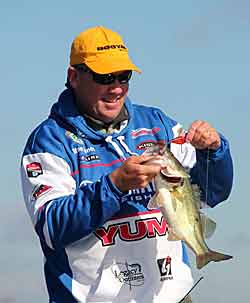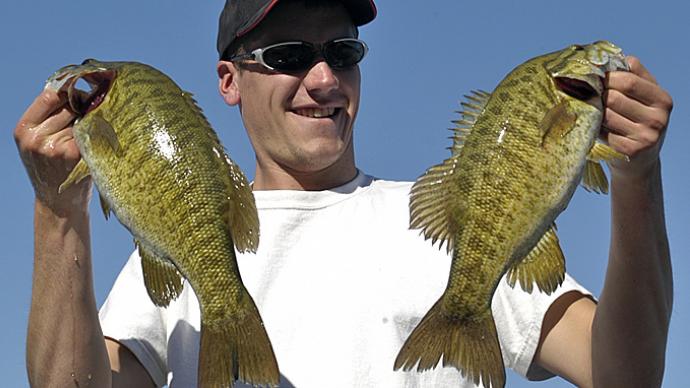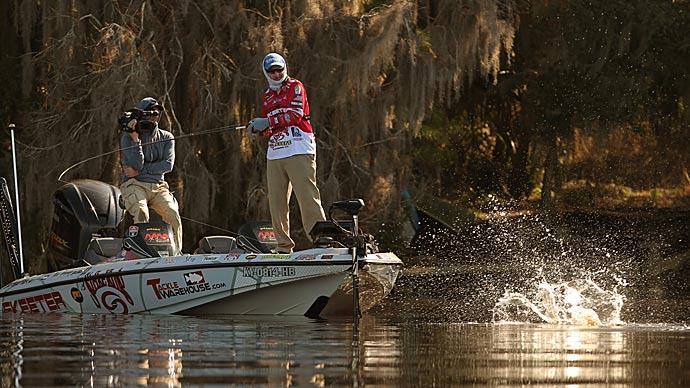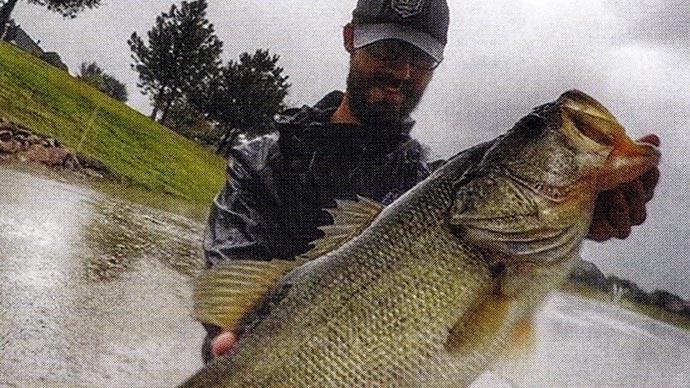
Entry fee amounts for professional events are the largest factor that has kept potential competitors from attempting to leap from regional or local events to the big leagues. In today's world, despite its economic woes, many people are nonetheless spending big bucks seeking the "big glory." You could expect to spend about $2,000 per event to get started.
Sponsors, then, are generally what one seeks first before trying to make it on the professional side of this sport. But that's tricky too. For a "newbie" coming up through the ranks, the general fare is the product and maybe a little money. In truth, until you have made a name for yourself, you aren't worth much more than that to the companies that provide such sponsorships. And making a name for yourself doesn't just occur on the water and at the weigh-in line.
Your first step to becoming a professional angler had best be self-assessment. That's right. Do you have good speaking skills? Are you capable of comporting yourself professionally at all times? How is your personality? Are you friendly and helpful among other anglers? All this and more must be part of your tactics if you "wanna be a pro."
And once you've made that "name" for yourself, does life get easier? Nope. Once at the top, you have to work even harder to stay there. And it takes a lot of work to keep pace with the new young pups.
Becoming a professional angler can almost be equated with catching a state-record bass. Myths abound about catching "the big one" and getting rich endorsing products and other such things. It just doesn't happen that way.
Luckily today, you can enjoy competing at any level you can afford. Most anglers get a start at the grassroots. That's generally in bass clubs. Many national pros fished with clubs before making the giant leap, others started in smaller local events. And it is in a bass club that you'll find competition in its most pure form. In clubs, it is done for the love of competing, not the money, since there's usually very little of that. You can win first place in most clubs and not win enough to pay for your gas for the day. However, at this level, not only men but their families can find the experience and zest of the competitive world.
It is also at this level that companies with fishing products should seek to apply for some funding. They "give" the pros products, but it is competitors among clubs and regional events that "buy" products. And yet, most of the larger company executives in this industry still desire to pour big bucks into big pros. Yes, their logo will be seen - possibly even on national television for 10 seconds. Or maybe not. Will it make you want to buy the products? Perhaps. And in defense of this promotional campaign, the pros have earned the rights they derive from this sport and the businesses that fuel it. Certainly, there are anglers that have run right out and purchased every product their favorite pro uses.
In reality, a lure maker, for example, can put a sample of their product into the hands of a bass club member for just the cost of the product. However, that bass club member will, if the product is deemed a good one, buy more themselves and promote sales of the product by mere word of mouth among their peers. So a balance must be struck between supporting the pros and grassroots groups.
And now comes the future, and many things have changed in the professional world. The "big leagues" have gotten so big and powerful that they can make the rules as they like, and still, people line up at their starting gate. It is becoming harder than ever to break into this world, not just because of expense, but now the sponsors you may get as an amateur may not even get what they paid for once you make it big because you might be prohibited from promoting them. So why should a company with not a lot of money, to begin with, pour money into an upcoming pro angler? Not much encouragement there. In other "arenas," the avenues leading to the big leagues are being slowly squeezed shut. So with only two major big leagues, they have the ball in their court on all counts. Again, this is their right. You wouldn't want anyone telling you how to conduct your business. Neither do they.
Professional events have raised the awareness level of competition fishing to an all-time high. Still, the economics of this sport must be taken into consideration, or else one day, they may all look back and realize that they have cut off their noses to spite the competition.
I have the most profound respect for the "bigs," and I know that it is because of them that we can do what we do on a smaller scale. But I hope within my heart of hearts that they look for ways to nourish the sport, not just feed upon it. The fundamental economics starts with you - the people who buy the products.
Fishing is suffering all-time lows in license purchases and boat purchases, and many companies are in trouble or scared in the strained economic times in which we live. Someone needs to give it all a shot in the arm, and I believe the best ones to begin doing that are the "big dogs." Perhaps the old saying, "If you can't run with the big dogs, stay on the porch." should be changed to "If you stay on the porch, the big dogs might just ruin the grass."
All the changes in the last few years in this sport have made me very proud that we continue to support bass clubs and regional semiprofessional leagues of events. You help pay the bills, not just for us, but for the "bigs" as well. They may have forgotten, but we haven't. We know who "brung us to the party."
And by the way, thanks.



